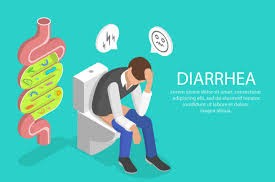Understanding and Managing IBS-D: A Guide to Living Better


What is Irritable Bowel Syndrome with Diarrhea (IBS-D)?
Have you ever experienced unpredictable bouts of diarrhea, abdominal pain, and discomfort that seem to appear without warning?
If so, you might be dealing with Irritable Bowel Syndrome with Diarrhea, commonly referred to as IBS-D. This gastrointestinal disorder affects millions of people worldwide and can significantly impact daily life. IBS-D is a subtype of Irritable Bowel Syndrome, primarily characterized by chronic diarrhea and abdominal pain.
Key Features of IBS-D:
- Affects the large intestine and disrupts normal bowel movements.
- Diarrhea is the dominant symptom, often accompanied by urgency.
- Symptoms tend to be recurrent but vary in intensity.
- No structural abnormalities are found in medical tests.
- Understanding IBS-D is the first step toward effective management. Though it can be frustrating and disruptive, knowing what you're dealing with helps reduce anxiety and target specific treatments.
Common Symptoms of IBS-D
What does living with IBS-D feel like on a day-to-day basis?
The symptoms of IBS-D are not only physically uncomfortable but can also be emotionally exhausting. They often strike without warning, making routine activities difficult.
Typical Symptoms Include:
- Frequent, urgent bowel movements often several times a day.
- Loose or watery stools that occur immediately after eating or in the morning.
- Abdominal cramps or pain that may be relieved after a bowel movement.
- Bloating and gas leading to visible abdominal distension.
- Mucus in the stool in some individuals.
These symptoms can wax and wane, sometimes disappearing for days or weeks only to return with full force. Their unpredictability is one of the most challenging aspects for sufferers.
Triggers and Risk Factors
Why does IBS-D happen, and what triggers it?
While the exact cause of IBS-D remains unclear, several factors are known to trigger or worsen symptoms. Understanding these can help individuals manage and prevent flare-ups.
Common Triggers:
- Certain foods, especially those high in fat, sugar, caffeine, or lactose.
- Stress and anxiety, which can affect gut motility and sensitivity.
- Hormonal changes, particularly in women.
- Infections, such as gastroenteritis, which can lead to post-infectious IBS.
- Gut-brain axis dysfunction, where the communication between the gut and brain is impaired.
Identifying personal triggers through a food diary or elimination diet can be key to better managing symptoms.
Diagnosis and When to Seek Help
When should you see a doctor about IBS-D symptoms?
Although IBS-D is not life-threatening, it is essential to seek medical advice to rule out other more serious conditions, such as Crohn’s disease, ulcerative colitis, or colorectal cancer.
Steps in Diagnosis:
- Medical history review, focusing on the duration and frequency of symptoms.
- Physical examination, often including palpation of the abdomen.
- Exclusion of other conditions through blood tests, stool analysis, or colonoscopy.
- Use of Rome IV criteria, a standardized tool to diagnose IBS.
It is important to consult a healthcare professional if you experience symptoms such as weight loss, rectal bleeding, or nocturnal diarrhea, as these may indicate something more serious.
Treatment Options and Lifestyle Adjustments
How can IBS-D be managed effectively?
Though there's no permanent cure for IBS-D, a combination of lifestyle changes, dietary adjustments, and medications can provide relief and improve quality of life.
Treatment and Management Strategies:
- Dietary modifications such as low-FODMAP diet to reduce fermentable carbs.
- Fiber supplements, particularly soluble fiber like psyllium.
- Stress management techniques like yoga, mindfulness, or cognitive behavioral therapy (CBT).
- Over-the-counter medications such as loperamide for diarrhea control.
- Prescription medications targeted at reducing gut motility and easing discomfort.
Consistency in these strategies often leads to significant symptom improvement over time.
A Medical Solution: Rixmin (Generic Name: Rifaximin)
Is there a medication specifically designed to treat IBS-D?
Yes, one of the promising options for treating IBS-D is Rixmin, with the generic name Rifaximin. This non-absorbable antibiotic works in the gut to reduce bacterial overgrowth and inflammation, which are believed to contribute to IBS-D symptoms.
Benefits of Rifaximin (Rixmin):
- Targets gut bacteria without affecting the entire body.
- Minimal systemic absorption, meaning fewer side effects.
- Proven efficacy in relieving diarrhea, bloating, and abdominal pain.
- Short course treatment, typically taken for 10 to 14 days.
- May provide long-term relief with occasional retreatment if necessary.
Patients should consult their healthcare provider to determine if Rifaximin is an appropriate treatment based on their individual symptoms and medical history.
While IBS-D can be a challenging and unpredictable condition, it doesn't have to control your life. With the right combination of medical care, lifestyle changes, and informed decision-making, many people with IBS-D find lasting relief. Understanding your body, identifying triggers, and exploring treatment options like Rifaximin can empower you to take back control and improve your daily quality of life.
Article Post:Editorial Team of RXShop.md
(Updated at Apr 5 / 2025)